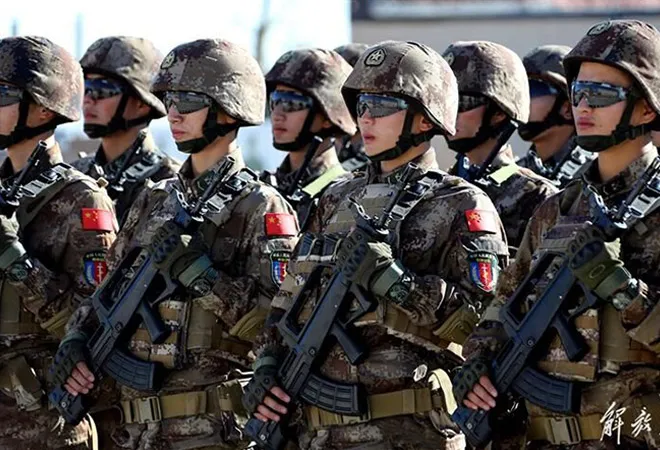
The viral outbreak of COVID-19 or Corona Virus that triggered a global pandemic shows no signs of abating, but the Peoples Republic of China (PRC), which was the source of the virus is confident it has weathered the worst of the pandemic. At the forefront of fighting and controlling the spread of the virus which started in Wuhan in China was the Peoples Liberation Army (PLA). PLA troops were deployed extensively to arrest the spread of the respiratory illness and in all probability, despite official denials, the virus potentially infected a sizeable number of troops deployed in and around the city of Wuhan the epicenter of the viral infection and the Hubei province. Wuhan also happens to be major submarine building center with orders from Pakistan and Thailand. The two putative factors behind this ostensible “recovery” are repression and secrecy enabling the Chinese state to conceal the extent of the infections among PLA troops. In addition, the Chinese military is flexing its muscles and may see an opportunity for pressing claims more robustly in the South China Sea and more menacingly even see an opportunity in targeting Taiwan. Thus, three issues are worth examining when it comes to China’s response to the viral outbreak. The first, is how affected PLA personnel are from viral infections, the second is the extent of the productivity losses and gains of Wuhan’s military industrial capacity and finally, the opportunities created by the pandemic for potential Chinese military action.
The military’s role in containing the spread of the COVID-19 does appear to have helped ease the worst effects of the viral outbreak. Nevertheless, reports indicate at least several hundred PLA soldiers deployed for the fight against virus were likely infected. Reinforcing this fact is that Wuhan is the headquarters of the PLA Logistic Support Force (PLALSF), whose service members are likely to have co-mingled with the local population making it highly implausible that at least select units of the service were unaffected. Wuhan is also a major railway hub and the units within the Peoples Armed Police (PAP) are unlikely to have escaped infection given their involvement in brutally enforcing the lockdown specifically in the Wuhan epicenter and the wider province of Hubei. In addition, notwithstanding the extensive expertise within the PLA in biological and chemical warfare, the PLASF medical units and militia involved in the containment of the viral spread could not have escaped infection given the inherently high transmissibility of COVID-19.
Secondly, the PRC is also revving up its military production capabilities from its Wuhan military industrial hub. Although not a coastal city, Wuhan is located close to the Yangtze river over 800 kilometers (km) from the sea but serves as a waterway to the East China Sea. Chinese submarine production has increased to meet orders from Thailand and Pakistan recently. The city is home to the Wuchang Ship Building Group, and several engineering and technical institutions that directly support the Chinese military’s needs covering electromagnetic catapults for aircraft carriers, railguns and submarine technology as well as service Beijing’s defence exports. There are indications that China has managed to limit the spread of the virus by at least keeping key military-industrial clusters in order to meet delivery requirements. However, full-scale military-industrial production will take a few months to restore, which would still be an impressive recovery, if it actually crystallizes. Meanwhile, the remainder of the advanced industrialized world would still be limping back to normalcy by the time China completes its recovery. Yet this is a speculative scenario and China could still face constraints due to a lack of sufficient demand from prospective importers of its military hardware and the Chinese regime’s existing fears of a renewed round of infections is likely to forestall revival Chinese defence production.
Finally, the pandemic presents China with opportunities in flexing its military muscle by pressing the PRC’s outstanding territorial claims. The sinking of the Vietnamese fishing trawler recently is illustrative of Beijing’s aggressiveness. Beijing also conducted military exercises in March in the South China Sea (SCS). Both regional and extra-regional powers in the Indo-Pacific are distracted, because virtually every country across the world has been affected by the COVID-19 preoccupying them to intensively arrest transmission of the virus. Regardless of Beijing’s fervent denials, the Coronavirus by default has provided Beijing with a chance to secure military gains. The pandemic has potentially created diversionary benefits for the Communist Party of China (CPC) enabling it to shore up the legitimacy of the regime by appealing to nationalism and play victim before its own people by selectively using the international opprobrium Beijing has had to endure in recent weeks and diverting attention away from the CPC dispensation’s manifest failures in containing the outbreak domestically and internationally. On the other hand, a potent extra-regional power such as the US despite its forward deployed presence in East Asia finds itself on the backfoot, if not at an outright disadvantage. Unlike Chinese naval and air forces, their most potent foe – the US Navy (USN), is constrained both by infection aboard one of its aircraft carriers and the tyranny of distance. Beijing is not similarly constrained as its forces operate closer to the mainland. While the USN can replenish American naval forces operating in the SCS and East China Sea (ECS) from its bases in Japan and Guam, nevertheless they are disadvantaged as crew aboard vessels in the USN’ Pacific fleet could be infected by Coronavirus limiting their replacement. Lacking instantly available crew on standby and located at a considerable distance in the American mainland, the USN is constrained where Beijing is not, giving the Chinese leadership a military opportunity.
A crisis is a terrible thing to waste. Chinese Communist Party seems to have internalized this dictum in the way it is using its military to make creeping gains while the rest of the world remains busy in managing the life and death of its populace. But whether it would allow Beijing to make long terms gains in its search for great power status still remains to be seen.
The views expressed above belong to the author(s). ORF research and analyses now available on Telegram! Click here to access our curated content — blogs, longforms and interviews.




 PREV
PREV



